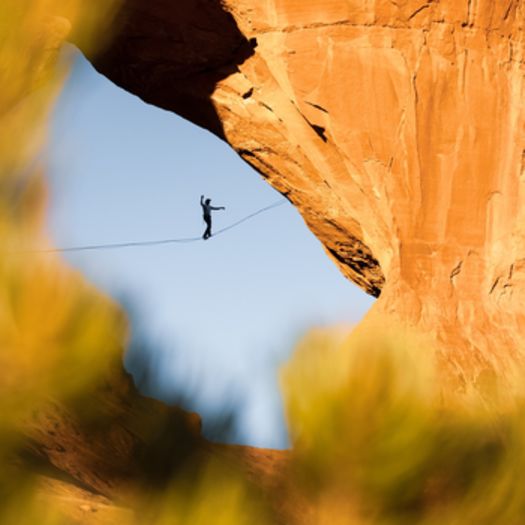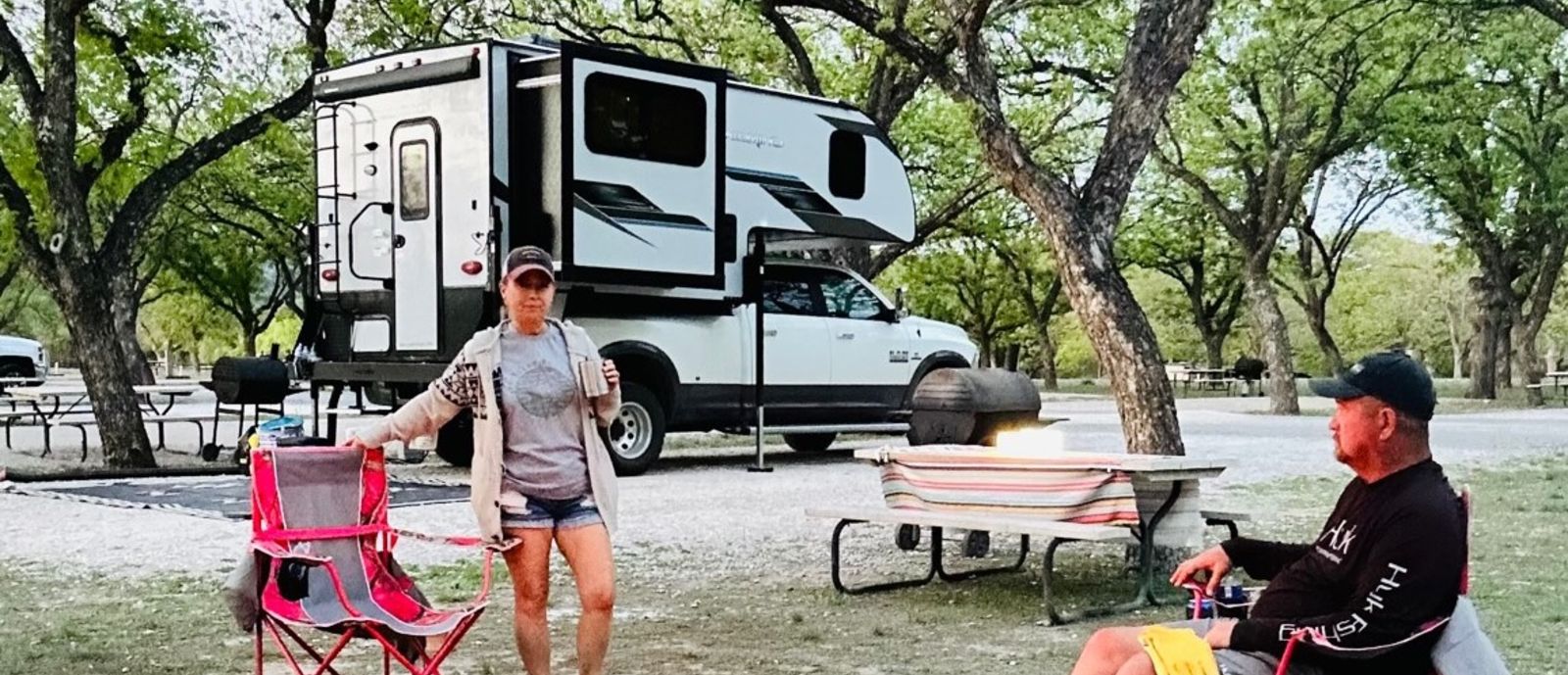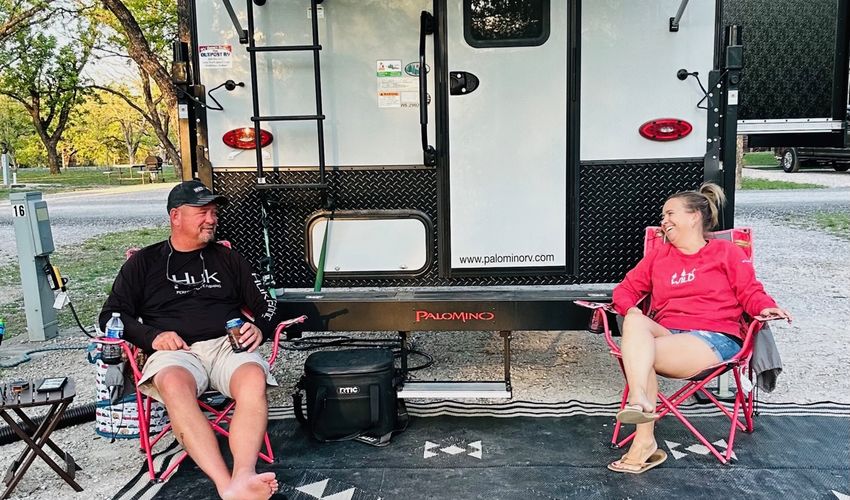Why Did We Choose a Truck Camper?
Our journey into the RV lifestyle started with simple tent camping. We both grew up spending time outdoors, and when we got married, we continued our camping adventures with just a tent. As our family grew, so did our need for more space and comfort. When our boys were young, we upgraded to our first travel trailer, which made camping easier and more enjoyable. Over the years, we transitioned to fifth wheels, loving the extra room and amenities they provided for family trips.
RELATED: Truck Campers
Now, with our kids grown and a new chapter ahead of us, we decided to downsize to a truck camper. The compact and flexible nature of a truck camper allows us to explore smaller, more remote destinations. Some national and state parks have size restrictions that make large RVs impractical, and we didn’t want to miss out on these incredible places. With a truck camper, we can go off-grid, access smaller campsites, and still enjoy all the comforts of an RV.
Essential Gear for New Truck Camper Owners
Since this was our first time owning a truck camper, we had to research the best gear to make our experience safe and comfortable. We couldn’t find a complete list of must-have equipment, so we built our own based on firsthand experience.
Here’s a list of our must-have items, complete with top-rated recommendations from reputable manufacturers, to ensure you're well-prepared for your truck camping adventures.
1. Tie-Downs
Securing your camper to your truck is paramount. Tie-downs are installed onto your truck's frame, providing the necessary attachment points to keep your camper stable during transit.
2. Turnbuckles
Turnbuckles connect the camper to the tie-downs, allowing for adjustable tension to keep the camper securely in place.
3. Rubber Truck Bed Mat
A rubber mat placed in the bed of your truck prevents the camper from sliding and reduces vibrations during travel.
- RECOMMENDED PRODUCT:
- Dee Zee Heavyweight Bed Mat: Constructed from compressed rubber compounds, this mat offers a non-slip surface and resists abrasion, ensuring both your truck bed and camper remain protected. Learn more
4. Front and Side Stabilizers
Stabilizers provide additional support, especially when the camper is off the truck, preventing tipping and reducing sway.
5. Surge Protector
Protect your camper's electrical system from power surges and faulty campground wiring with a reliable surge protector.
- RECOMMENDED PRODUCT:
- Progressive Industries EMS-PT30X: This portable surge protector offers real-time monitoring of voltage and amperage, with surge protection up to 44,000 amps. It's designed for 30-amp systems and provides peace of mind when connecting to external power sources. Learn more
6. Air Suspension Airbags
Airbags help maintain proper truck leveling, improve ride quality, and enhance handling when carrying the additional weight of a camper.
- RECOMMENDED PRODUCT:
- Air Lift LoadLifter 5000: This air suspension kit offers up to 5,000 pounds of load-leveling capacity, reducing strain on your vehicle's suspension and improving safety. Learn more
- Firestone Ride-Rite Air Helper Springs: Designed to maximize your vehicle's safe load-carrying capacity, stability, and ride quality, these air springs are a popular choice among truck camper owners. Learn more
7. Hitch Extender
A hitch extender allows you to tow additional equipment or mount accessories by extending the hitch receiver beyond the camper's overhang.
8. Water Filtration System and Drinking Hose
Ensuring access to clean water is vital. A quality filtration system paired with a safe drinking hose keeps your water supply fresh and contaminant-free.
- RECOMMENDED PRODUCT:
- Camco TastePURE Drinking Water Hose: This BPA-free hose is designed specifically for RVs, ensuring your drinking water remains safe and free from plastic taste. Learn more
- Camco RV Inline Water Filter: This inline filter reduces bad taste, odor, chlorine, and sediment in drinking water, providing a reliable solution for clean water on the go. Learn more
9. Dehumidifier
Managing moisture inside your camper prevents mold and mildew, especially in humid climates.
- RECOMMENDED PRODUCT:
- Eva-Dry E-333 Renewable Mini Dehumidifier: This compact, renewable dehumidifier requires no power to operate and is perfect for small spaces, effectively absorbing moisture to protect against mold and mildew. Learn more
10. Backup Power Solutions
Having an alternative power source ensures you have electricity during off-grid adventures or unexpected outages.
- RECOMMENDED PRODUCT:
- Battle Born LiFePO4 Deep Cycle Battery: Known for reliability and longevity, these lithium iron phosphate batteries provide a lightweight and maintenance-free power solution for your camper. Learn more
- Go Power DuraLite 100-watt Solar Kit: This solar kit includes panels and a charge controller, offering a sustainable way to keep your batteries charged. Learn more
RELATED: Getting Started with RV Solar Power: A Beginner's Guide to Off-Grid …
Transitioning to a truck camper has been an exciting and rewarding experience for us. The ability to explore remote areas while still enjoying the comforts of an RV is exactly what we were looking for. Investing in the right gear has made our travels safer, more efficient, and more enjoyable. Whether you're a new truck camper owner or an experienced RVer making the switch, these essential items will help you hit the road with confidence.
No matter where your truck camper takes you, being prepared with the right equipment makes all the difference. Happy camping!















